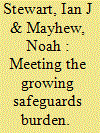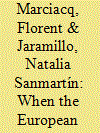| Srl | Item |
| 1 |
ID:
090286


|
|
|
|
|
| Publication |
2008.
|
| Summary/Abstract |
This article reflects on the experience of India's engagement with China in two multilateral forums: the Bangladesh-China-India-Myanmar (BCIM) Forum for Regional Economic Cooperation, formerly known as the 'Kunming Initiative', and the China-India-Russia Academic Trilateral Conference. Though both forums are so-called 'Track Two' ventures, the dynamics of the two exercises are rather different. As of now, the 'Trilateral' is rated relatively successful in so far as it has shown more substantial progress from 'Track Two' to 'Track One'. Tracing these brief histories, this article argues that academic cooperation should be seen to have value in and of itself, and not merely as the mechanism that propels a speculative, academic exercise into state-to-state policy.
|
|
|
|
|
|
|
|
|
|
|
|
|
|
|
|
| 2 |
ID:
171177


|
|
|
|
|
| Summary/Abstract |
The International Atomic Energy Agency (IAEA) faces challenges in fulfilling its safeguards mandate as a result of an expanding safeguards burden and a relatively static budget. This dilemma has been exacerbated by the additional burdens of implementing the Joint Comprehensive Plan of Action (JCPOA) in Iran, but would not go away if implementation of the JCPOA were to end. There are three main areas of opportunity for the Agency: (1) budgetary expansion tied to changes in staffing policies, (2) changes in safeguards approaches, and (3) technological innovation. Barriers and limitations are associated with each approach, and advancing any of them will face a difficult political environment in Vienna.
|
|
|
|
|
|
|
|
|
|
|
|
|
|
|
|
| 3 |
ID:
137409


|
|
|
|
|
| Summary/Abstract |
Once only coordinating the foreign policy of its member states, the European Union (EU) now endeavors to speak on behalf of non-EU states. In the Organisation for Security and Cooperation in Europe (OSCE), its declarations are often backed by a large number of countries. This article enquires into the function of diplomatic alignment. Its findings question the use of alignment as a normative benchmark for European integration. It argues that adherence to EU norms is not the only rationale for alignment, and, more interestingly, that there are valid reasons not to align, which do not contradict EU norms, as well as more questionable reasons to align, which do. This article, in conclusion, argues that the function of alignment supports the EU's claim for international leadership, and that the reactions of non-EU states should be gaged in the light of this venture.
|
|
|
|
|
|
|
|
|
|
|
|
|
|
|
|